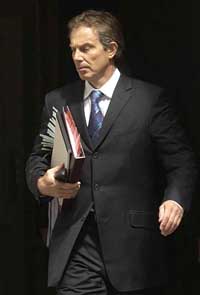Blair announcing resignation after 10 years in office
Prime Minister Tony Blair is announcing on Thursday that he will resign after 10 years leading Britain's government, a Labour party official said.

"There are a mixture of emotions today. There's disappointment and sadness that we are losing the prime minister after 10 years," said John Burton, Blair's political representative in his northern parliamentary district of Sedgefield. "But there's joy, happiness and thanks for what has been achieved."
The 54-year-old Blair was traveling to Sedgefield to speak to staff at Trimdon Labour Club - where he launched his campaign to become Labour leader in 1994 - and spell out his intentions.
It's an announcement that Blair's Labour Party, and the nation, have been expecting for nearly three years, ever since the prime minister said in 2004 that his third term would be his last.
"Today, the beginning of the end," read the front page of The Guardian newspaper.
Blair first would resign as leader of the Labour Party, then would step down as head of government once a new leader is elected.
Blair met earlier with Cabinet members, who left No. 10 Downing Street without answering questions shouted by reporters swarming outside. "For once, Cabinet discipline is holding," quipped Jack Straw, leader of the House of Commons.
Blair would leave office in late June or early July, depending on how quickly his party elects a successor _ almost certain to be Treasury Chief Gordon Brown, Blair's partner in reforming the party as "New Labour" but an impatient rival in government.
Brown has already declared he will be a candidate; at least one opponent from the party's left wing was expected to announce his candidacy Thursday afternoon. Burton said Blair would continue to represent Sedgefield in Parliament until the next national election, expected in 2009, unless he is offered "a major international or United Nations job."
The Iraq war, a police investigation of allegations that the government traded honors for political contributions and endless questions about when Blair would step down overshadowed his last term in government, after winning the third term in May 2005.
Blair has stopped short of openly endorsing Brown, a stern Scot who has long coveted the top job, but said last week that Brown would make "a great prime minister."
"One of the things I very much hope will be part of the legacy of the government is the strongest economy in the Western world which he has been responsible for," Blair said.
Blair led Labour to two landslide election wins in 1997 and 2001, and a narrower but still comfortable victory in 2005.
The first term was marked by several significant initiatives: the Bank of England was given the freedom to set interest rates, Scotland and Wales were given regional governments, London gained an elected mayor and all but 92 hereditary members were ejected from the House of Lords.
In 1998, Blair and Irish Prime Minister Bertie Ahern led successful negotiations for a peace agreement in Northern Ireland, launching a process which reached its culmination earlier this week as former enemies from the Protestant and Catholic communities joined to form a new regional government.
The Iraq war severely dented Blair's popularity. Blair's close alliance with President George W. Bush was unpopular at home, there were mass marches in Britain opposing the U.S.-led invasion before it began, and the government's claims that Saddam Hussein was building an arsenal of weapons of mass destruction proved false.
For more than a year, Labour has consistently trailed in opinion polls behind a Conservative Party revived by its new leader, David Cameron.
In local and regional elections earlier this month, Labour lost hundreds of seats in city and county councils, and was beaten into second place in the Scottish Parliament elections by the Scottish National Party, which advocates independence.
In recent months, Blair's thoughts have turned to the lessons of his decade in power.
"When I first started in politics, I wanted to please everyone," Blair said during a valedictory tour of the Middle East in December. "After a time I learned that you can't please everyone, and you learn that the best thing is to do what you think is right and everyone can make their judgment."
Subscribe to Pravda.Ru Telegram channel, Facebook, RSS!




